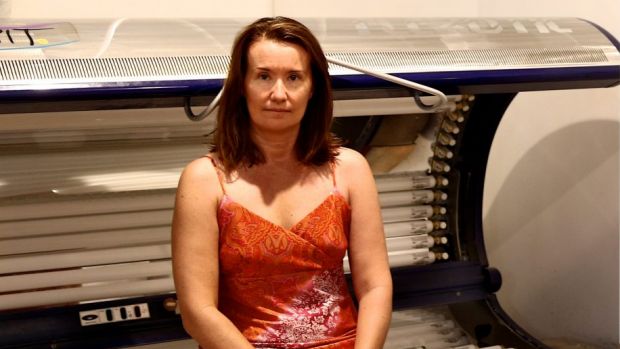
Refusing to sell: Fiona Gamble is holding onto her seven solariums. Photo: Brendan Esposito
The ban on commercial solariums is sparking a dangerous rise in home tanning, according to salon operators who have labelled the NSW government’s buy-back scheme as a failure.
Sydney sunbed owners have chosen to sell their powerful units for about $5000 each via websites such as eBay rather than opting to have them destroyed for $1000 under the government’s scheme.
Only 27 sunbeds from 15 businesses have been destroyed under the scheme, which began in mid-2013, new data from the Environment Protection Authority shows. In January 2012, there were 254 solariums at 103 businesses registered with the EPA.

Top up: Fiona Gamble sprays Frederick Cole. Photo: Brendan Esposito
Fiona Gamble, owner of Soleil Tanning in Darlinghurst, is holding onto her seven solariums worth $30,000 each. She has not made any final decisions.
“I’ve had my business here for 16 years and a thousand dollars for a bed is an insult,” she said.
“I just had a couple of customers pick up their solarium cream because their friend had just purchased a sunbed.”
Ms Gamble now runs a spray tanning business, but customer numbers have dropped significantly.
Environment Minister Rob Stokes said he was satisfied by Cancer Council and EPA’s conclusions there was “no evidence” purchases were being made “in any significant numbers”.
“I note [the] concern about private use. Most commercial tanning beds require three phase power to operate, which would severely limit private citizens using them in their own homes,” he said.
The EPA said the $1000 buy-back offer was only set to cover disposal costs and not compensate businesses.
“The aim of the scheme was to ensure the machines were safely and securely disposed of, without risk to the environment or human health,” an EPA spokesperson said.
In Victoria about 30 per cent of the 264 registered tanning units have been collected under its buy-back scheme.
Cancer Council NSW’s prevention manager, Vanessa Rock, said they were keeping a watching brief on the potential growth of online sales.
She urged owners offloading their machines online to question their responsibility to the community.
“If we can prevent anyone from dying from using those machines, well I think we all have personal responsibility to do that,” she said. “I’d appeal to them to use the buy-back scheme.”
Ms Gamble from Soleil said customers were still looking for UV light, including sufferers of the skin disease psoriasis. She said in-home UV tanning was dangerous.
“We didn’t let people come within 48 hours, we skin-typed people and we didn’t let those underage use it. So who’s going to police that at someone’s home? And who’s going to use the beds? Children?”
Carl Turner, from Brazilian Sunset beauty salons in Melbourne, listed two solariums on Gumtree for $4000 each late last month. Health officers contacted him after the ban came into effect on January 1 to pull the listings as “they were illegal”.
“I’ve had people calling me saying I don’t have enough to buy the bed, but if anybody buys it, give them my number. Lots and lots of people are doing that.”
On Saturday, Fairfax Media saw 17 posts on Gumtree from regular solarium users desperate to get their next UV light fix. They were prepared to pay.
“I promised my parents I wouldn’t use it anymore, but they can’t stop me. Me and my friends are looking for one,” said a user named Kayla from inner Sydney, who declined to give her surname.
Fairfax Media has also seen Facebook posts containing contact details of a black market solarium business.
The Cancer Council said studies show those who use a solarium before the age of 35 have a 59 per cent greater risk of melanoma than those who do not.
Under new laws, which came into force in NSW on December 31, anyone caught offering UV tanning services risks fines of up to $44,000. The government estimates that from 2016 about 10 lives will be saved and approximately 120 people will no longer have to undergo treatment for skin cancer
“We will be carrying out unannounced inspections of all relevant businesses this year to ensure operators are complying with the new rules,” an EPA spokesperson said.
